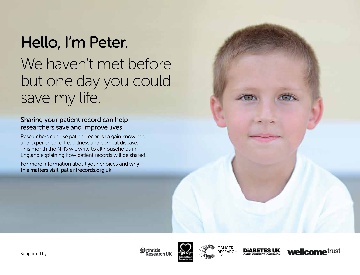A group of leading health research organisations have come together to launch an advertising campaign aimed at discouraging patients from opting out of NHS England’s flagship data-sharing scheme.
The campaigners have said that ‘people will die’ if too many patients opt out of the care.data scheme, which will see patient records shared both inside and outside the NHS.
The campaigners, which include Cancer Research UK, Diabetes UK, The British Heart Foundation and Arthritis Research UK, said they fear patient opt-outs could be ‘harmful’ to science.
They will warn the public that opting out of this program could undermine the ‘safe, effective operation of the health service’ and that without access to this data for research it could lead to the death of patients.
The advertising mission is being funded by the Wellcome Trust and has been launched to coincide with NHS England’s public awareness campaign ahead of the launch of care.data from April.
It will attempt to convince the public that centrally collecting the data and making it making it available to academic, charitable and commercial organisations is necessary for NHS commissioners as well as the UK life sciences sector.
It comes as Pulse has reported that at least two GPs have already opted all of their patients out of the scheme amid patient confidentiality concerns, while others are planning to do so.
A campaign statement says: ‘Patient records are an extremely valuable resource for research. The information contained within them can be used to understand the causes of disease or to detect outbreaks of infectious diseases.’
Speaking at the launch of the campaign, Dr Peter Weissberg, a cardiologist with the British Heart Foundation, said widespread health data sharing was essential to making medical advances and that without it medical side-effects of drugs and behaviour may go unnoticed for longer.
He said: ‘We can carry on making [discoveries] without, but we will make them extraordinarily slowly and people will die in the interim. Not only will they die as a consequence of habits and behaviours they have, which we haven’t understood properly,[ but] they will die as a consequence of well-meaning attempts by doctors…[who are] treating patients on a daily basis on what we call the evidence base.’
‘[For example], antihistamines, we were dishing them out like smarties to people with hay fever until eventually the penny dropped that some people were dying as a conesequence of heart-rythmic disturbances.’
Also speaking at the event, Professor Liam Smeeth – a north London GP who also heads the non-communicable disease epidemiology at the London School of Hygiene and Tropical Medicine – said he understood confidentiality concerns but thinks patients opting out of sharing their data presents a bigger risk.
He said: ‘I think there is a risk of people opting out of this kind of thing. These are data that are absolutely necessary to keep the NHS up with the times, to develop new inventions, or to be safe and effective, so we know what’s going on in the health service. It’s completely necessary. I think people opting out, saying “no, no I don’t want to share my data even if it is anonymised and confidential”, it is about trying to convince people that that has a harmful effect.’
‘There are people worried about confidentiality but I am hoping there aren’t people sitting around saying we don’t need to do this because we don’t need this data.’
The care.data scheme will begin extracting data from patients records in March with full roll out expected in May. Originally designed to link patient information across primary and secondary care for the first time, the scheme was expanded last March to allow third parties to apply to make use of data from within the record.

Pulse October survey
Take our July 2025 survey to potentially win £1.000 worth of tokens













